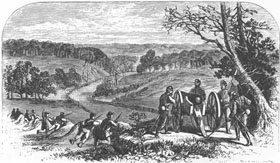 |
Civil War Battles |
|
State War Records |
| AL - AK - AZ - AR - CA - CO - CT - DE - FL - GA - HI - ID - IL - IN - IA - KS - KY - LA - MA - MD - ME - MI - MN - MS - MO - MT - NE - NV - NH - NJ - NM - NY - NC - ND - OH - OK - OR - PA - RI - SC - SD - TN - TX - UT - VT - VA - WA - WV - WI - WY |
The Battle of Booneville
July 1, 1862 in Booneville, Mississippi
 |
|||||||||||||||||||||
|
Following the battle at Shiloh in April, and before the Confederate evacuation of Corinth that October, Confederate forces concentrated at Tupelo, about 50 miles south of Booneville. To protect the movement of Confederate infantry to that city, Brig. Gen. James R. Chalmers feinted, clashing with 2 cavalry regiments under Col. Philip H. Sheridan a few miles west of Booneville.
When Sheridan's advance guard made contact, he immediately supported it, sending 4 companies to hit the Confederate rear. Stubborn but indecisive fighting continued all day, until Chalmers' superior force retired unmolested. At 5:00 P.M., Sheridan requested a battery of artillery, with which he thought he "might be able to follow up the enemy", but at 9:30 A.M. the next morning he reported that "the enemy has skedaddled."
Sheridan then wrote a report that made him look masterly, resulting in his first publicity. His men had fought doggedly, in hand-to-hand combat. Sheridan asserted that "loss of the enemy must have been severe," later estimating the number of Confederate dead at 65.
Maj. Gen. William S. Rosecrans immediately recommended that "Sheridan ought to be made a brigidar. He would not be a stampeding general!" Brig. Gen. Alexander S. Asboth telegraphed to Washington that "he is worth his weight in gold," while Brig. Gen. Gordon Granger praised "the excellent management of the troops by Col. Sheridan...". Ten weeks later Sheridan got his promotion, backdated to the day of the battle at Booneville.
No official Confederate report of the battle survived, and veterans later claimed that not any Confederate had been killed and only 1 was wounded. In 1916, Chalmers' aide-de-camp wrote that "Napolean, in defining history, said it was 'fabled agreed upon.' Apply that ...to Sheridan's report of this insignificant skirmish...and we realize how much fiction there is in recorded incidents of the War". Apparently Chalmers never contested Sheridan's account because of the former postwar Republican political aspirations. Whgatever the truth, the encounter gave the Union one of its most relentless and effective cavalry generals.
